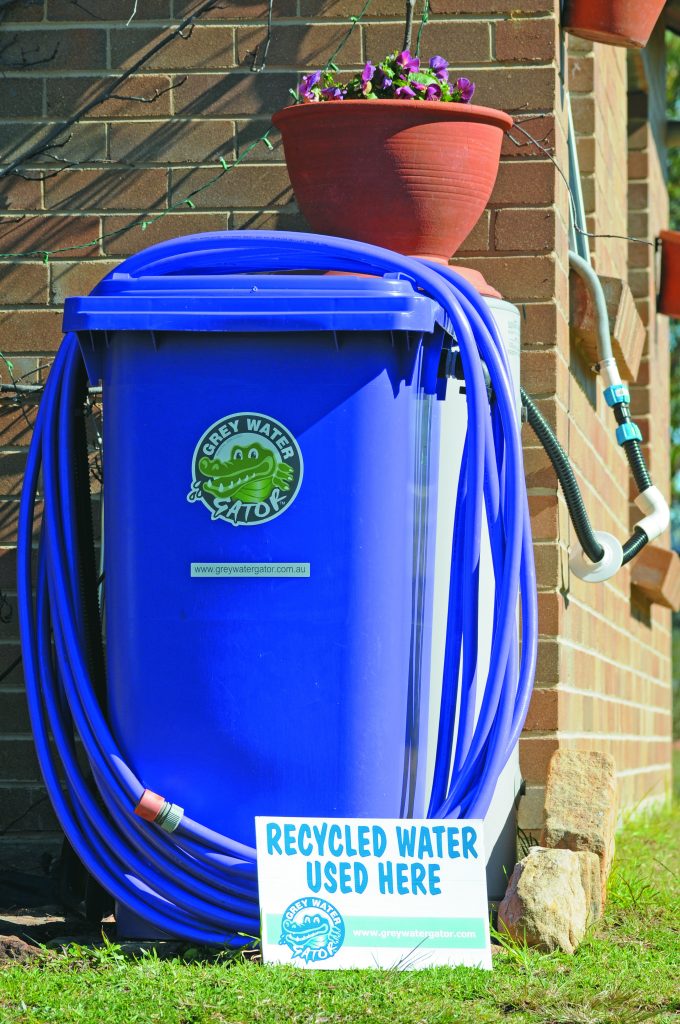How to make use of greywater
Share
Greywater that gurgles down your plug-hole can be reused on your garden.
Using greywater has become an important water conservation resource and it’s easy to employ this in a water-wise garden. With our experience of droughts and enforced water restrictions, many gardeners are embracing the reuse of water to keep their gardens alive. Sydney Water has estimated that the average household (3.5 people) produces 586 litres of waste water a day, which roughly translates into about 350 litres of greywater that could easily be recycled.
Did you know we can use up to 40 per cent and more of our water just on gardens during the summer months? This can depend, of course, on the size of your garden but it puts a huge overall demand on mains water supplies. This stress on water supplies can be dramatically alleviated by choosing the right plans, employing smart landscaping techniques, capturing rainwater and reusing greywater.
What is greywater?
Greywater is the water that is discarded down the plugholes inside your house and it can account for up to 60 per cent of waste water. Greywater is the household water that has been used in the bath, shower, spa, hand basin and washing machine. This is not the water from your toilet flushing. Kitchen-sink waste water is not recommended for garden use because it may contain high levels of fats, food residue and other impurities.
Bathroom greywater is sometimes used on gardens provided it doesn’t contain too much soap, bubble bath or shampoos etc. Laundry (washing machine) water is the best to recycle for use on the garden as long as you use eco-friendly laundry powders that do not contain phosphates and are clearly marked “garden friendly” on the packaging.
How to go grey
Reusing greywater can be as easy as bucketing water from the washing machine or outside shower, or you can install an automatic greywater diversion and irrigation system. But, before you purchase and install any kind of greywater recycling system, you need to contact your local water authority, council or health department. Regulations vary across Australia regarding what house water can be recycled, the method of installation, treatment (if any) and the type of irrigation system that can be used.
What type of system?
What type of greywater system you choose will depend on your budget, where you live, your existing plumbing network and the landscape of your garden. Greywater systems are either diversion systems or treatment systems.
- Diversion systems: These directly divert greywater from the laundry or bathroom to the garden for immediate use. The water is not stored for more than a few hours, if at all.
- Treatment systems: The quality of the greywater is improved by filtering, disinfecting or otherwise “treating” it. Treated water can be stored for longer, is of a higher quality and can be used for toilet flushing, clothes washing and on the garden.
Irrigating with greywater
The safest way to transport your greywater to your garden is through sub-surface irrigation pipes. These need to be at least 10cm below the ground surface. Make sure a filter is installed to trap any debris, such as lint or hair, that may be in the greywater.
A layer of mulch on top of the irrigation system prevents greywater rising to the surface. Monitor your greywater carefully to make sure no run-off escapes from your property. Occasionally check the pH level of the greywater and remember not to use greywater on fruits, vegies, herbs or any other edible plant.
Choose products carefully
Reusing greywater from the laundry is easy but the right choice of laundry products is essential. Many chemicals go into most laundry products and these could kill beneficial insects and soil microbes and damage your plants. Laundry powder packaging will inform you about the products ingredients but here is a good guide.
Choose laundry powders that:
- Are phosphate-free
- Are low in sodium
- Are readily biodegradable
- Are concentrated
- Can be used in cold water
- Have packaging states “garden friendly”
You can also take an extra environmental step and choose laundry powders such as Aware, for example, which is made from plant-based ingredients, is palm oil-free and does not contain petrochemicals.
Greywater rules
- Use only greywater systems that are accredited by your local authorities.
- Regulations require that all greywater must stay within your property.
- Do not allow greywater to pool on the surface of your yard.
- Do not use greywater from nappy washing.
- Do not let children play in greywater.
- Do not drink greywater.
- Do not let your pets drink greywater.
- Wear gloves when touching greywater and wash your hands after touching it.
- Use greywater on alternate areas in your garden.
- Do not use greywater on plants you intend to eat (except to the root zone of fruit trees).
- Allow the greywater to cool as hot greywater damages plants.
- Do not use untreated greywater for surface irrigation.
- Do not store greywater for more than a few hours.
ALDI leads the way
Phosphate, which is made from synthetic materials, is the main ingredient in soaps and laundry products and is what provides the products’ cleaning efficiency. However, phosphates have a harmful effect on our fresh water supply and our rivers and streams. The supermarket chain ALDI is taking a green stance and all laundry detergents in their stores will be phosphate-free by 2013. Other supermarket chains say they will follow.









